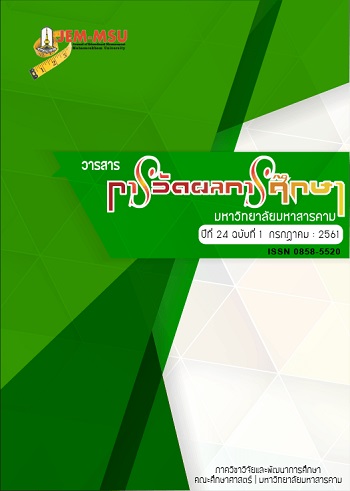The Development of Mathematics Teacher Competency in Content and Language Integrated Learning Management According to Lesson Study Approach
Main Article Content
Abstract
The purpose of this research was 1) to study the performance of mathematics
teachers in management. Learning integrated content and language according to the learning
process. 2) To study teacher competency. 3) to study the mathematics and technology
teachers' competencies, 4) to study the learning achievement of the students who received
the learning management. 5) to study the satisfaction of mathematics teachers on the
development process. The target group consisted of 5 mathematics teachers in the
Northeast region namely Roi Et, Khon Kaen, Mahasarakham, Kalasin, Nakornratchasima. The
quantitative and qualitative research data will be collected from August 2014 to December
2014. The instruments used in this research are: 1) integrated learning plan, 2) A model for
assessing skills in using technology and electronic communication systems; 4) a learning
achievement test; 5) a satisfaction assessment form; The Development Process Data were
analyzed by baseline, frequency, percentage, mean, standard deviation The results of the
research were as follows: 1) Mathematics teacher competencies in learning management
based on the learning process. The teacher conducts a five-step learning package consisting
of: 1) analytical and critical thinking, 2) critical thinking, 3) teaching and criticism, 6) In the
past round, adjusted to develop in the next round by doing 3 rounds to develop their own
teaching 92%. 2) Mathematics competencies in English language. Learn to integrate
mathematics with English. 88%. 3) Competence of mathematics teachers in technology and
information. 4) The learning achievement of students who have been taught the learning
outcomes of post-test were 70%. 5) Satisfaction of mathematics teachers towards
development process accounted for 88 percent.
Article Details
The content and information contained in the published article in the Journal of Educational Measurement Mahasarakham University represent the opinions and responsibilities of the authors directly. The editorial board of the journal is not necessarily in agreement with or responsible for any of the content.
The articles, data, content, images, etc. that have been published in the Journal of Educational Measurement Mahasarakham University are copyrighted by the journal. If any individual or organization wishes to reproduce or perform any actions involving the entirety or any part of the content, they must obtain written permission from the Journal of Educational Measurement Mahasarakham University.
References
กรุงเทพฯ : (ม.ป.พ.).
2. สุรพงศ์ งามสม. (2555). แนวคิดการพัฒนาครูเชิงระบบยุคใหม่ . เอกสารประกอบการอบรมครู. 5 ธันวาคม
2552. สานักงานคณะกรรมการการศึกษาขั้นพื้นฐาน, กระทรวงศึกษาธิการ. แนวการจัดการเรียนรู้สู่
ประชาคมอาเซียน ระดับประถมศึกษา. กรุงเทพฯ : โรงพิมพ์ชุมนุมสหกรณ์การเกษตรแห่งประเทศไทย.
3. Anderson, L. W., & Krathwohl, D. R. (Eds.). (2001). A taxonomy for learning, teaching
and Assessing : A revision of Bloom's Taxonomy of educational objectives:
Complete edition. New York : Longman.
4. Herzberg, Frederick, Bernarol and Synderman, Barbara Bloch. (1959). The Motivation to Work.
New York : John Wiley and Sons, lnc.
5. Inprasitha, Narumol. (2009). Lesson Study: Innovation for Developing Teacher and Students.
Thesis for Doctor of Education, Graduate School, Khon Kaen University.
6. Inprasitha, Narumol. Et al. (2009). Research Report on the Change of Teacher’s.
Visin towards Teacher Professional Development Process Using Lesson
Study. Khon Kaen University.
7. Jones, Jo and Martin. (2013). Empowering Learners With Mobile Open-Access Learning
Initiatives.
8. Lewis. C.,. (2002). Lesson Study : A handbook of teacher-led Instructional change.
Research for better school, Inc.
9. Smith, Robin Rudd. (2005). Lesson Study : Professional Development for Empowering
Teachers and Improving Classroom Practice. A Dissertation of Doctor of
Philosophy, College of Education, Florida State University.
10. Skemp, R. R. (1976). Relational understanding and instrumental understanding, Mathematics
Teaching, 77, 20–26.
11. Scott G. Paris,Gary M. Olson,Harold W. Stevenson. (1970). Learning and Motivation in the
Classroom. New York : John Wiley and Sons, lnc.
12. White, D. Y., & Spitzer, J. S.,. (2009). Mathematics for Every Student: Responding to Diversity
Grades Pre-K-5. Reston, Association Drive,


